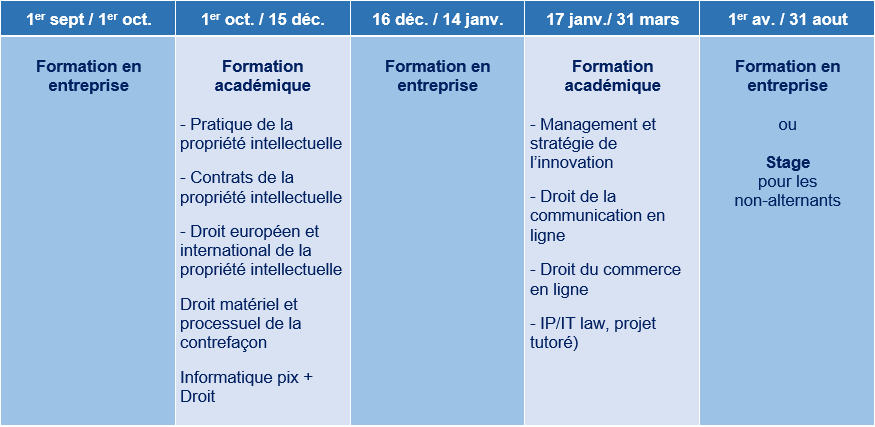Teaching program
1st year
Semester 7
- TU General introduction to intellectual property (33h-4C)
- TU Private international law (33h-4C)
- TU In-depth competition law (33h-4C)
- TU Distribution law (sales/services) (33h-4C) + TD
- TU General tax law (33h-4C) + TD
- TU Civil law: securities (33h-4C)
- TU Language (8h CM)
Semester 8
- TU Intellectual property law (33h-4C)
- TU Private digital law (33h-4C)
- TU Public digital law (33h-4C)
- TU Distribution law (networks/groups) (33h-4C) + TD
- TU Business lawTU (33h-4C) + TD
- TU Commercial law: collective proceedings (33h-4C)
- TU Professional integration (internship or research report) (4C)
- Legal clinic (optional)
2nd year
Semester 9
- TU Intellectual property practice (104h-8C)
- TU Intellectual property contracts (45h-7C)
- TU European and international intellectual property law (20h-6C)
- TU Substantive and procedural counterfeiting law (30h-6C)
- TU C2i "Legal professions" (PIX) (12h-3C)
Skills acquired:advice (legal clinic) + case analysis + documentation research + oral presentation with ppt support (presentation) + contract drafting
Semester 10
- TU Innovation management and strategies (36H-6C)
- TU Online communication law (actors, instruments and liability) (44h-7C)
- TU E-commerce law (players, instruments and contracts) (27h-7C)
- TU Language - IP/IT Law (20h-3C)
- TU Tutored project (Research dissertation or Learning dissertation) (4C)
Skills acquired:pleading (National Intellectual Property Pleading Competition - CN2PI) + organization of the "Digital Law Update" conference + drafting of case law summaries.
Annual calendar

Work-study programs and apprenticeships
Work-study calendar
The calendar is the same for all training participants, see Annual Calendar.
Number of training hours
Academic training: 344h
On-the-job training: 980h
Tutored project: 140h
A few rules about alternating work and family life :
- The apprenticeship contract is drawn up in writing and signed by the employer, the apprentice or their legal representative, using cerfa n°10103*07 or FA 13. In addition to general information about the employer and apprentice, the contract specifies that the apprentice master meets the required conditions of professional competence.
- The apprenticeship contract is open to young people aged 16 to 29 at the start of the apprenticeship (article L6222-1, French Labor Code), i.e. the contract must start no later than the day before the apprentice's 30th birthday.
- The duration of the apprenticeship contract is equal to that of the "training cycle preparing for the qualification which is the subject of the contract". In all cases, the minimum duration of training at the training center must be equal to 25% of the duration of the contract, i.e. a minimum of 402 hours for a 12-month contract, for example.
- The start date of the practical training period with the employer may not be more than three months after the contract start date. The start date of the training period at the apprentice training center.
- The apprenticeship supervisor's role is to support the apprentice and help him or her acquire the skills required for the desired qualification, in liaison with the CFA (apprentice training center). This role may be shared between several employees. The apprentice master must be an employee of the company, voluntary, of legal age and of good character.
- Apprenticeships are not open to newcomers, and foreign students can only sign an apprenticeship contract after their first year of residence. Once they have signed an apprenticeship contract, foreign applicants holding a residence permit can apply for a work permit from the "Main-d'oeuvre étrangère" (MOE) office of the DIRECCTE.
- An apprentice with a disability can be administratively recognized in order to benefit fully from his or her rights. To do this, the application for Recognition of the Status of Disabled Worker (RQTH) must be sent to the Maison Départementale des Personnes Handicapées (MDPH) in the place where the apprentice lives.
- Apprenticeship conditions in the public sector are the same as in the private sector, with a few exceptions. Apprenticeship contracts signed with a public authority are private-law fixed-term contracts (CDD).
- In the event of failure to pass the exam, the apprenticeship contract may be extended, either with the same employer in the form of an amendment to the contract, or by signing a new contract with another employer. However, this extension may not exceed one year. In the event of a further failure, no further extension may be obtained.
Please note, however, that the Master 2 year cannot be repeated!
Since January 1, 2019, apprentices have been eligible for €500 in funding for their driving license. This state-funded aid is administered and paid by the CFA.
For more information on work-study contracts, see CFA-EnsupLR.